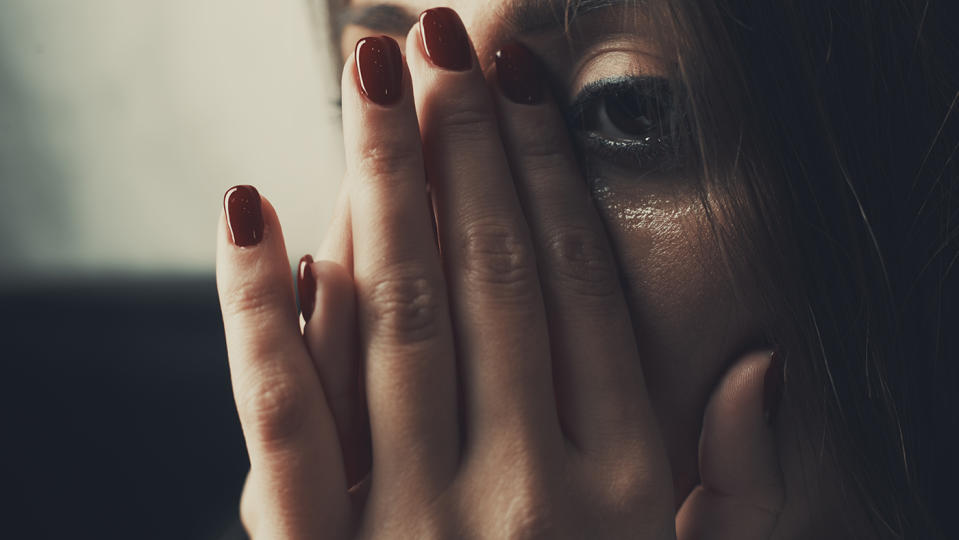What do if you're experiencing lockdown in an abusive relationship
The National Domestic Abuse helpline has seen a 25% increase in phone calls and online messages requesting help since lockdown began. And while the government are allowing people to leave their homes during lockdown to escape domestic abuse, it is not always that simple.
Jenni Steele, Domestic Violence UK ambassador and founder of the YANA Project, which supports young people who have been directly affected by domestic violence, knows only too well how hard it is to leave a violent relationship.
READ MORE: Lockdown can make it even more difficult to escape an abusive relationship
Appearing on new video series, Up Close And Socially Distant, Jenni spoke to host Kate Thornton about her own experience of abuse.
“As a teenager, I was a victim of domestic abuse,” she revealed. “It was my first boyfriend. I was about 17, 18, at the time, and there weren’t a lot of services for me as a young person.”
Jenni is raising awareness about the issues that often make it difficult for people to escape their abusers - particularly during lockdown – such as emotional and financial abuse and the need to ensure the safety of children.
Don’t make a rash decision
Whether it’s financial abuse, where your partner isn’t giving you any money, or you’re worried about the safety of your children, many women can’t just up and leave: even if the lockdown has made things worse at home.
“It’s not easy for everyone to leave today,” explained Jenni. “Sometimes leaving today can put you in more danger, so sometimes there needs to be a plan mapped out around that.
She continued: “It’s not as easy as we all think and I do find that if you haven’t been in that situation before, then it’s not something that you can actually know how that person is going to feel at that time.”

Find out what support is there for you
Jenni is worried that some people may not know where to turn for local support.
“I think right now there's a lot of information everywhere,” she said. “I think there's a possibility that some of it isn't coming out as clear as it should.”
One central resource that is useful, is a text directory, which has been set up recently by Domestic Violence UK.
Jenni said: “It's a phone number that you can text DIRECTORY and it will send you the services that are in your area. This is support services. There's like over a hundred charities providing support – email support, they're providing call backs, they're providing web chat services.”
READ MORE: 276 London choir members record song from home to raise over £30k for domestic abuse victims
There are also lots of great online resources out there and Jenni says many of them are built so you can hide the fact that you may be looking for help.
“A lot of the support services online actually have buttons and stuff on their website that you can quickly click out,” she said. “It doesn't come up on your browser.”
Use your daily walk
If your abuser has taken away your phone, signalling for help – or even just ringing someone for support – will be tricky in these lockdown times. Jenni said that it’s important to try and use your daily exercise as it might be your only point of call.
“Try and speak to someone – it’s really important,” said Jenni who suggests approaching your local shopkeeper if you’re in distress and know them well enough.
READ MORE: What to do if you need to dial 999 during coronavirus lockdown but can't speak
She continued: “There might be an actual friend that lives near to you that you can just go and put a note through their door.”
Know how to alert authorities
If things have got so bad that you are in immediate danger, Jenni says you need to call 999, however there is also a service where if you can’t talk you can still get help.
Jenni advises: “Call 999, press 55 and don’t say anything [just follow voice prompts to cough and tap the handset]. That will alert the police to come to your address.”
How can you help support a friend who is going through this?
If you’ve got a friend who you suspect is living with an abuser, Jenni says it’s important to make them aware that you are here for them.
“It's a real tough time,” she admitted. “I think we need to be aware of people around us, their surroundings, what they're going through.
READ MORE: What is Intimate Partner Violence?
“We need to be open to someone actually having that conversation with us in this time because that person is going to need us.”
She continued: “All I can say to family and friends is: please be aware, please be non-judgemental in this time because that’s not going to help anyone.”
Text DIRECTORY to 07786 202 430 to reach Domestic Violence UK who will signpost you to services in your local area. There are over 100 charities providing support to the DVUK Text Directory including call backs, web chat support and signposting. To add your service, go to lovedoesnthurt.org.uk for more info.
Up Close And Socially Distant is hosted by Kate Thornton and features video catch-ups with people who are all doing whatever they can, in whatever unique and special way they can, to help those around them get through lockdown.
This week Kate speaks to comedian and creator of the ‘Baked Potato Song,’ Matt Lucas,
Domestic Violence UK ambassador and YANA project founder Jenni Steele, and psychotherapist and Help Hub founder, Ruth Chaloner.


